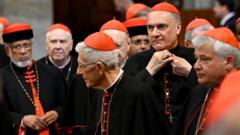Canadians cast their ballots today in an election that will determine the nation's leadership amid ongoing U.S. trade challenges and shifting voter sentiments. Prime Minister Mark Carney, recently appointed, faces Conservative leader Pierre Poilievre in a race that has tightened dramatically over recent months, as public opinion fluctuated due to President Trump's impact on Canada’s economy and sovereignty.
Canada's Future at Stake: Polls Open as Election Day Arrives Amid U.S. Tensions

Canada's Future at Stake: Polls Open as Election Day Arrives Amid U.S. Tensions
In a pivotal moment, Canadians vote to choose their next leader, as Prime Minister Mark Carney faces off against Conservative leader Pierre Poilievre in a backdrop of U.S. trade disputes and changing political dynamics.
With polls showing a neck-and-neck race, the outcome could redefine Canada’s political landscape. While the Liberal Party had been expected to lead comfortably, recent developments have shifted the dynamics completely. Under Carney's leadership, the Liberals have seen a resurgence, positioning themselves as the party to best address President Trump's tariff threats and potential annexation remarks. Contrarily, Poilievre's campaign has struggled with comparisons to Trump himself, impacting his electoral prospects.
As Canadians vote, their choice carries the weight of significant national issues including economic stability, trade relations, and social policies. This election has drawn high participation from early voters as nearly 7.2 million Canadians took advantage of the advance voting opportunities. With polling stations opening throughout the day across the nation, Canadians are urged to remain in line to cast their votes, even if polls close while they wait.
In the end, who can effectively represent Canada’s interests in a highly charged political environment will likely define the election results as ballots are counted into the night.
As voters take to the polls, Canada turns an important page in its political history, with results to be closely monitored nationwide.
As Canadians vote, their choice carries the weight of significant national issues including economic stability, trade relations, and social policies. This election has drawn high participation from early voters as nearly 7.2 million Canadians took advantage of the advance voting opportunities. With polling stations opening throughout the day across the nation, Canadians are urged to remain in line to cast their votes, even if polls close while they wait.
In the end, who can effectively represent Canada’s interests in a highly charged political environment will likely define the election results as ballots are counted into the night.
As voters take to the polls, Canada turns an important page in its political history, with results to be closely monitored nationwide.






















